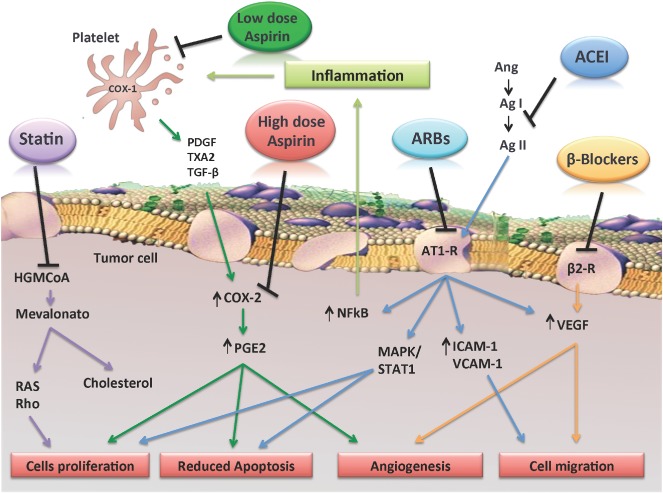Figure 1.

Possible mechanisms underlying antitumor effect of aspirin and other drugs used in the treatment of CVD. Low‐dose aspirin and high‐dose aspirin may affect different steps of colon tumorigenesis. By selectively blocking platelet‐COX‐1 activity and the release of mediators such as TxA2, PDGF, TGF‐β, and PGE2, low‐dose aspirin may inhibit relatively early events in the progression from normal mucosa to adenoma that are involved in platelet‐dependent induction of cell transformation. In particular, low‐dose aspirin might counteract the overexpression of COX‐2 and subsequent increase of PGE2, induced by platelets, in stromal and epithelial intestinal cells, thereby inhibiting cell proliferation and angiogenesis. High‐dose aspirin might directly inhibit COX‐2 activity once it is expressed in intestinal adenomas, reducing the progression of the neoplastic lesion and metastasis. It has also been proposed that statins, ACEIs, ARBs, and β‐blockers, acting through different pathways, may reduce angiogenesis, cell proliferation and migration, and inflammation. Abbreviations: ACEI, angiotensin‐converting enzyme inhibitor; Ag I, angiotensin I; Ag II, angiotensin II; Ang, angiotensinogen; ARB, angiotensin receptor blocker; β2‐R, β2 receptor; AT1‐R, angiotensin II type I receptor; COX‐1, cyclooxygenase‐1; CVD, cardiovascular disease; HMG‐CoA, HMG‐CoA reductase; ICAM‐1, intercellular adhesion molecule‐1; MAPK, mitogen‐activated protein kinase; NFκB, nuclear factor κ B; PDGF, platelet‐derived growth factor; PGE2, prostaglandin E2; RAS, RAS protein superfamily of small GTPases; Rho, rho mainfamily of small GTPases; STAT1, signal transducer and activator of transcription‐1; TGF‐β, transforming growth factor β; TXA2, thromboxane A2; VCAM‐1, vascular cell adhesion molecule‐1; VEGF, vascular endothelial growth factor.
